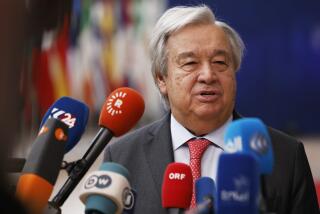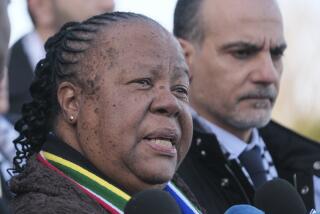W. Europeans Call Home Ambassadors to S. Africa
- Share via
HELSINKI, Finland — Foreign ministers of the European Community agreed Thursday to condemn South Africa’s state of emergency and to summon home their ambassadors to Pretoria for consultations. But they remained deeply divided on the question of applying economic and trade sanctions against the white-minority regime.
Instead, the returning officials are scheduled to meet in Brussels with political and economic experts from their own governments and from Common Market headquarters to draw up a list of measures the community might take “to contribute to the abolition of apartheid,” according to a statement released here.
These recommendations will be considered at the next regular foreign ministers’ session scheduled Sept. 10 in Brussels.
These moves--plus a condemnation of South African President Pieter W. Botha for refusing to hold immediate talks with Bishop Desmond Tutu, the 1984 Nobel peace laureate--were the only actions that the foreign ministers could agree on during a late-night meeting described as “long and difficult.”
In condemning Botha’s refusal to meet promptly with Tutu, the Europeans called on South Africa to “open a dialogue with all the representatives of the black community.” These representatives, they said, should include “those who are in prison.”
They split angrily over how to penalize South Africa--with Britain and West Germany being the primary holdouts on imposing sanctions--and the final statement did not even mention the word “sanctions.”
Spain and Portugal, who are in the process of gaining Common Market entry, joined the 10 members of the European Community in the discussion--even though they will not formally enter the trade bloc until January. All the foreign ministers are in Helsinki for the 10th-anniversary observance of the signing of the Helsinki agreements on security and cooperation in Europe.
French External Relations Minister Roland Dumas, whose country recalled its South African ambassador last week, said the other European countries will order their envoys to report to Brussels for consultations. Individual governments would then decide whether their ambassadors should return to South Africa, he said.
There was not a full consensus among the foreign ministers on how to describe the recall. British Foreign Secretary Geoffrey Howe emphasized that “asking them to return for consultations is not a recall.”
In London, Prime Minister Margaret Thatcher said that despite Britain’s opposition to apartheid, she has no intention of pulling its ambassador out of South Africa permanently. She said the British envoy will return to Pretoria after attending the Brussels meeting because she wants him in South Africa “to know exactly what is going on.”
History of Ineffectiveness
Howe also reaffirmed Britain’s strong opposition to sanctions and its preference for using diplomacy to effect change. “Economic sanctions have not been effective in the past and are not likely to be in this case,” he said.
He was backed by West German Foreign Minister Hans-Dietrich Genscher, who said, “We should not just jump from one sanction to another.”
France and Belgium, on the other hand, pushed strongly for some form of economic penalties by community members.
Dumas, the French representative, said the action taken by the Europeans falls “far short” of what his government had hoped for. But he said he is pleased that at least some joint stand had been taken, adding there is the possibility of going further.
More to Read
Sign up for Essential California
The most important California stories and recommendations in your inbox every morning.
You may occasionally receive promotional content from the Los Angeles Times.













